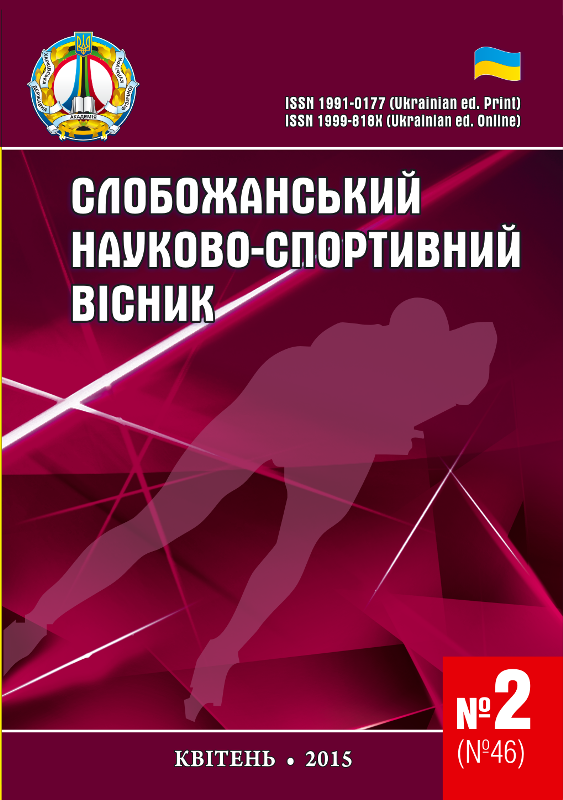The relationship of psychophysiological characteristics karate qualifications in light weight category with the effective implementation of kick leg techniques in upper level of the opponent
DOI:
https://doi.org/10.15391/snsv.2015-2.032Keywords:
Karate, Kyokushinkai, characteristics, psychophysiology, kick, efficiencyAbstract
Purpose: set the density of the relationship of psycho-physiological characteristics of karate qualifications in light weight category with the efficiency of the implementation of kick leg techniques in the upper level of the opponent. Material and Methods: The study involved thirty highly skilled karatekas in light weight category. Conducted pedagogical and psychophysiological testing, carried out an analysis of competitive actions, carried out a special analysis of scientific and methodical literature, applied the methods of mathematical statistics. Results: The degree of correlation between the obtained numerical results of psycho-physiological characteristics and indicators of the effectiveness different types of gradient kicking karate qualifications in light weight category in upper level of the opponent. Conclusions: karatekas high qualifications in light weight category, the higher the strength of neural processes in the processing of information in the imposed rhythm, the more reliable in a competitive match under implementation methods kick leg them with maximum power and speed-up in upper level of the opponent, and at the higher they characteristic of functional mobility of nervous processes in the processing of information in the imposed rhythm, the greater the likelihood of fighters attacking moves fast.
References
Bundzen P. V., Golub Ya. V. Tr. yubileyn. konf. «Fizicheskaya kultura i sport v usloviyakh sovremennykh sotsialno-ekonomicheskikh preobrazovaniy v Rossii» [Physical culture and sport in contemporary socio-economic transformations in Russia], Moscow, 2003, p. 308–310. (rus)
Dubovoy A. V., Sayenko V. G. Oraldyn fylym zharshysy «Pedagogicheskiye nauki. Istoriya» [Оraldyn fylym zharshysy "Pedagogical sciences. History»], Uralsk, 2013, p. 114–118. (rus)
Zhdanov Yu. N. Psikhofiziologicheskaya podgotovka yedinobortsa [Psychophysiological preparation single combat athlete], Donetsk, 2003, 592 p. (rus)
Korobeynіkov G. V., Bіtko S. M., Sakal L. D. Aktualnі problemi fіzichnoі kulturi і sportu [Contemporary Problems of Physical Culture and Sports], Kyiv, 2003, p. 53–60. (ukr)
Lizogub V. S. Ontogenez psikhofіzіologіchnikh funktsіy lyudini : Avtoref. dis. … dokt. bіol. nauk [Ontogeny of physiological functions of human :doct. of science thesis], K., 2001, 29 p. (ukr)
Makarenko M. V. Fіzіologіchniy zhurnal [Physiological magazine], 1999, T. 45, vol. 4, p. 125–131. (rus)
Maksimenko І. G., Tolchеva G. V. Teorіya і praktika fіzichnogo vikhovannya [Theory and practice of physical education], Donetsk, 2011, vol. 3, p. 305–315. (ukr)
Rovnyy A. S. Slobozans’kij nauk.-sport. visn. [Slobozhanskyi science and sport bulletin], Kharkіv, 2015, vol. 1(45), p. 104–108, dx.doi.org/10.15391/snsv.2015-1.020. (rus)
Savchin M. P. Trenovanіst boksera ta іі dіagnostika [Fitness boxing and its diagnosis], Kyiv, 2003, 220 p. (ukr)
Saеnko V. G. Pobudova і kontrol trenuvalnogo protsesu sportsmenіv v kіokushinkay karate [Construction and control the training process in kyokushin karate athletes], Lugansk, 2012, 404 p. (ukr)
Saеnko V. G. Aktualnі problemi fіzichnoі kulturi і sportu [Contemporary Problems of Physical Culture and Sports], Kyiv, 2007, vol. 13, p. 63–67. (ukr)
Saеnko V. G. Suchasnі tekhnologіі u sferі fіzichnogo
vikhovannya, sportu ta valeologіі [Modern technologies in the field of physical education, sport and valeologii], Kharkiv, 2008, p. 99–102. (ukr)
Saеnko V. G., Sklyar M. S. Vіsnik Chernіgіvskogo natsіonalnogo pedagogіchnogo unіversitetu іmenі T. G. Shevchenka [Journal of Chernihiv National Pedagogical University named after Taras Shevchenko], Chernіgіv, 2013, Vol. 107., T. II, p. 366–369. (ukr)
Saеnko V. G. Pedagogіka, psikhologіya ta mediko-bіologіchnі problemi fіzichnogo vikhovannya і sportu [Pedagogy, psychology and medical-biological problems of physical education and sport], Kharkiv, 2007, vol. 9, p. 119–122. (ukr)
Tolchеva G. V. Pedagogіka, psikhologіya ta mediko-bіologіchnі problemi fіzichnogo vikhovannya і sportu [Pedagogy, psychology and medical-biological problems of physical education and sport], Kharkіv, 2011, vol. 11, p. 128–131. (ukr)
Tolchеva G. V. Slobozans’kij nauk.-sport. visn. [Slobozhanskyi science and sport bulletin], Kharkіv, 2015, vol. 1(45), p. 129–133, dx.doi.org/10.15391/snsv.2015-1.023. (ukr)
Dzurenkova D. Somatic and functional profiles of members of the Slovak karate teame / D. Dzurenkova., E. Zemkova // Bratisl. Lek. Listy, 2000. – Vol. 41, № 2. – P. 256 – 262.
Jagiełło W. Morphological diversification of female judo athletes / W. Jagiełło, R. Kalina, G. Korobielnikow // Archives of Budo, 2007. – Vol. 3. – R. 27 – 34.
Korobeynikov G. Diagnostics of psychophysiological states and motivation in elite athletes / G. Korobeynikov, L. Korobeynikova, K. Mazmanian, W. Jagiello // Bratislava Medical Journal, 2011. – № 112 (11). – P. 637 – 644.
Ralph B. Energetics of karate kumite / B. Ralph, B. Thorsten, J. Christop // Eur J Physiologyh, 2004. – P. 518 – 523.
Downloads
Published
How to Cite
Issue
Section
License
Copyright (c) 2015 (Vladimir Saienko) Саєнко Володимир Григорович

This work is licensed under a Creative Commons Attribution 4.0 International License.
Our publications make use of copyright CREATIVE COMMONS open access journals.
Authors published in this journal agree to the following terms:
1 The authors reserve the right of authorship of the work and pass the journal right of first publication of this work are licensed under the Creative Commons Attribution License, which allows others to freely distribute the published work with reference to the authors of the original work and the first publication of this magazine.
2 The authors have the right to enter into separate agreements for additional non-exclusive distribution of work in the form in which it was published the magazine (such as work place electronic repository institution or publish as part of the monograph), provided that the reference to the first publication of this magazine.

 Attention, authors!
Attention, authors!


